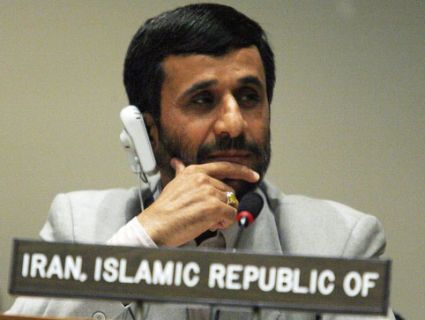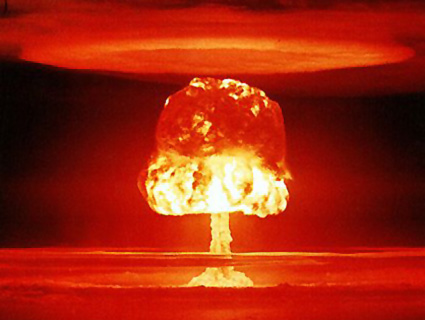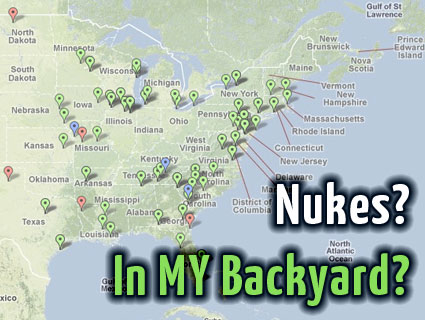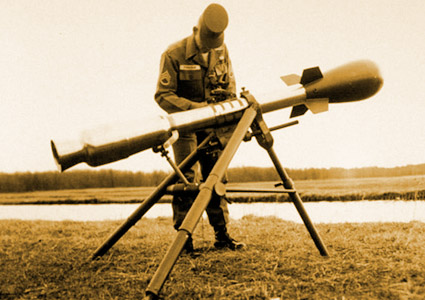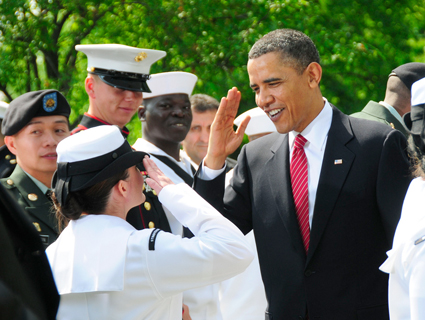
<a href="http://www.defense.gov/HomePagePhotos/LeadPhotoImage.aspx?id=43372">Todd Lopez/US Army</a>
Sometime this month, after receiving a year’s worth of research and analysis from the Pentagon and his national security advisers, President Obama will get to decide for the first time in his term what the United States’ nuclear war strategy should look like. Every four years, the strategy comes up for review and revision; Obama could determine its scope, where it’s aimed, and whether the US could use nukes for a first strike.
In light of the deficit cold war gripping Washington and the post-Iraq move toward a more conventional military strategy, Obama has an unprecedented opportunity to reduce the world’s danger of nuclear attack, security expert Joseph Cirincione wrote in Foreign Affairs on Thursday. (Full disclosure: Cirincione is president of the anti-proliferation Ploughshares Fund, a global security foundation which has provided funding to Mother Jones.)
Since early in his presidency, Obama has insisted that the US should work to reduce and eventually eliminate its stockpile of nukes. He re-emphasized that point last month when announcing his new overall military strategy at the Pentagon. “It is possible that our deterrence goals can be achieved with a smaller nuclear force,” he said, “which would reduce the number of nuclear weapons in our inventory as well as their role in U.S. national security strategy.”
Current conditions certainly seem ripe for nuclear reductions. Politicians from both parties have been looking for cuts in the federal budget. Some of America’s nuclear-armed missiles, bombers, and subs are reaching the end of their operational lives and could either be replaced at great expense, or allowed to “sunset.” But most important, according to Cirincione, the president now has his once-in-a-lifetime (or, at least, once-in-an-elected-term) shot to change the nation’s nuclear policy guidance, with potentially huge benefit to US fiscal strength and military posture alike.
For instance, the Navy argues that it needs a total of 12 nuclear-missile submarines just to be able to keep five in the water at all times, ready to launch their missiles. The extra seven come at an added cost of $350 billion. “Why would the Navy have to keep five of these new subs (two in the Atlantic and three in the Pacific), each with 16 missiles carrying up to eight nuclear warheads apiece, at sea ready to fire? Because the current nuclear policy guidance says it must,” Cirincione points out.
Current US nuclear strategy states that American forces must be able to deliver at least 1,000 atomic warheads against multiple targets within 20 minutes of a launch order. If Obama simply eased back on the numbers of this requirement, the sub force could remain at eight, and the president could save the nation $120 billion. Delaying orders on a new bomber could save $68 billion more, and slowing down the replacement of nuclear missiles could save untold billions.
The conservative-minded pushback to all this boils down to a basic question: Wouldn’t such cutbacks jeopardize American security? In fact, they wouldn’t change America’s military superiority much at all, experts say. That’s because the current US nuclear strategy is based on “excessive, expensive” parameters set up in the 1970s—including targeting rules that basically dictate dropping atomic bombs on every factory in every city in enemy territory with a population of 250,000 or more, so as to “prolong their post-war recovery.” Says Cirincione: “This is the strategy that justifies the approximately 5,000 weapons in the US arsenal today.” Beyond the US and Russia, no other country deploys more than 300 nukes.
Hans Kristenson and Robert Norris of the Federation of American Scientists recently wrote that US nuke levels have “been in excess of national security needs for some time,” in part because of “outdated presidential nuclear guidance.” It probably takes a lot less than 5,000 warheads to deter (or annihilate) China, North Korea, or Iran—to say nothing of Al Qaeda and other post-9/11 transnational threats that can’t be nuked out of the picture.
So, if Obama can save billions and still keep America and its allies safe, what’s the holdup? Besides the fact that it’s an election year, and the president’s potential challengers are all casting aspersions on his national security acumen (never mind bin Laden), he’s also been constrained by the machinations of a dysfunctional Congress. Last year Rep. Michael Turner (R-Ohio), chairman of the House armed services subcommittee that bankrolls nukes, fought for a fat budget to update and upsize the nuclear arsenal; he said the money provided “meaningful work to our talented scientists and engineers.”
Although Turner asserted that “strategy must drive force structure, not the other way around,” his budget strongarming accomplished the opposite: Obama might be constrained to a nuclear policy that follows Congress’ hawkish, pork-laden guidelines. “Unless this is reversed,” Cirincione writes, “in the coming decade Washington may actually spend more on the country’s nuclear weapons programs than it has in the past.”
The question, then, becomes how willing the president is to leverage his executive power in a big way on national security during a reelection campaign. Which Obama will show up to the nuclear rodeo, the defiant or concilliatory one? By the end of the month, we’ll all know.
